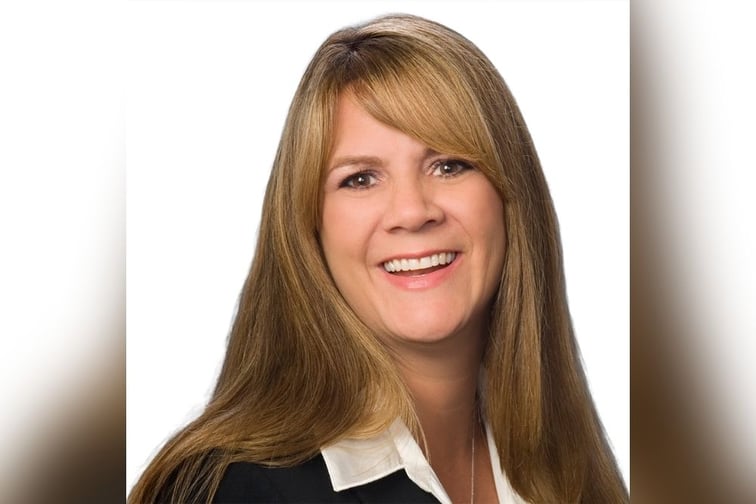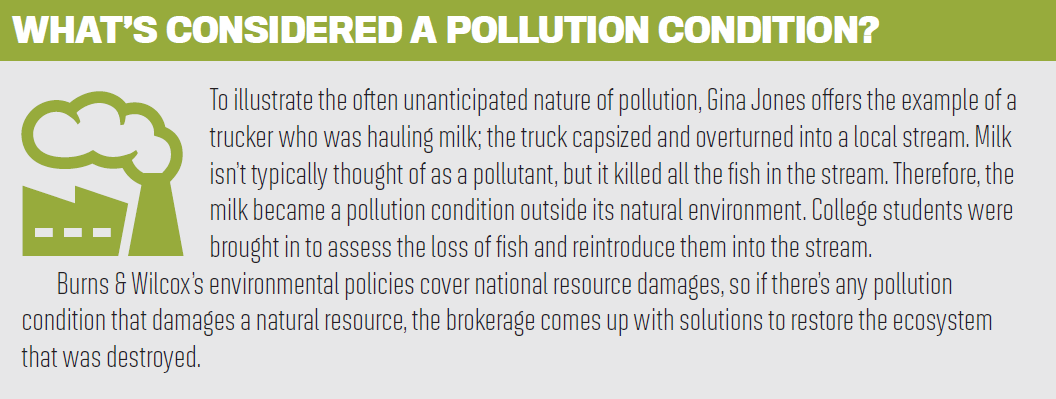

Over the past decade, pollution has become a growing global concern. Recognizing this, Gina Jones, vice president and director of environmental programs at Burns & Wilcox, created an Environmental Center of Excellence, where she trains her team to structure policies so that if a client suffers an environmental loss, the team is able to respond to any pollution condition and provide coverage for a breadth of issues. Each policy is individually tailored, depending on what local governments or entities deem an environmental condition, and exposures vary depending on where a client is located.
“Every single client has an environmental exposure,” Jones says. “Clients think that if they don’t deal with something toxic or hazardous, they don’t have an exposure. What they’re not taking into consideration is if you have something disastrous happen, such as a hurricane, and water washes through your building, causing asbestos or lead to be released, that is a pollutant.”
Natural disasters tend to inadvertently impact environmental claims, from chemicals released by the destruction of Hurricane Harvey in Houston and the Gulf Coast area in 2017 to the forest fires that burned throughout the West in 2020 and preceding years. Because anything irregular coming into a natural environment as the result of a catastrophe can pollute it, Jones says, “our policies don’t exclude anything that’s considered a catastrophe, such as flood, hail or wind.”
Climate change has caused an increase in severe weather events, so Jones says clients should be proactive in seeking agents who can educate them on how to mitigate environmental risks, as many clients aren’t able to predict losses or liability exposures themselves.
“The biggest problem we have in the environmental area is that clients don’t think they have exposure, so they don’t buy the insurance and they’re left to pick up the pieces after the fact,” she says.
Carriers have also been carefully under-writing and pricing for emerging issues such as catastrophes and climate change.
“If water levels are rising, and it causes flooding in a paint manufacturer or gas station, all of those chemicals are now being released and creating an excess of pollutants,” Jones points out. “Climate change is a growing issue and something that should be thought about with respect to environmental insurance.”
What’s unique to Burns & Wilcox is that the brokerage has a team of 15 people in the Environmental Center of Excellence who are dedicated to environmental coverage and education. They know the carriers, the land-scape and what individual clients need to make sure they’re properly insured.
 “Our policies can be adapted and changed to fit clients’ needs,” Jones says. “We’re able to cover and manage clients’ risks and have environmental engineers who work with us to understand the gravity of specific exposures. We try to provide education on potential exposures, but the problem is, people are afraid to talk about environmental insurance because they don’t understand it. We try to let agents and clients know we’re here to help and have the expertise to answer questions about what exposures there may be.”
“Our policies can be adapted and changed to fit clients’ needs,” Jones says. “We’re able to cover and manage clients’ risks and have environmental engineers who work with us to understand the gravity of specific exposures. We try to provide education on potential exposures, but the problem is, people are afraid to talk about environmental insurance because they don’t understand it. We try to let agents and clients know we’re here to help and have the expertise to answer questions about what exposures there may be.”
Burns & Wilcox’s Environmental Center of Excellence aims to educate agents about the environmental coverage available so that agents can educate their clients to relieve the stress of potential losses. “We’re here to talk about it and make agents comfortable when engaging in those conversations,” Jones says.
She stresses the importance of having continuous conversations with clients. Standard environmental policies can always be enhanced and changed. They’re written in such a way that there is a baseline, but that can shift based on emerging environmental risks. Bringing in the right experts to assess exposures, provide claims examples and develop strategies for mitigating risks will help agents determine where environmental insurance fits in their client base.
“The absence of loss doesn’t mean the absence of risk,” Jones says. “It’s important to stress to our clients that just because you’ve never had an environmental loss doesn’t mean you don’t or won’t have a risk.”

